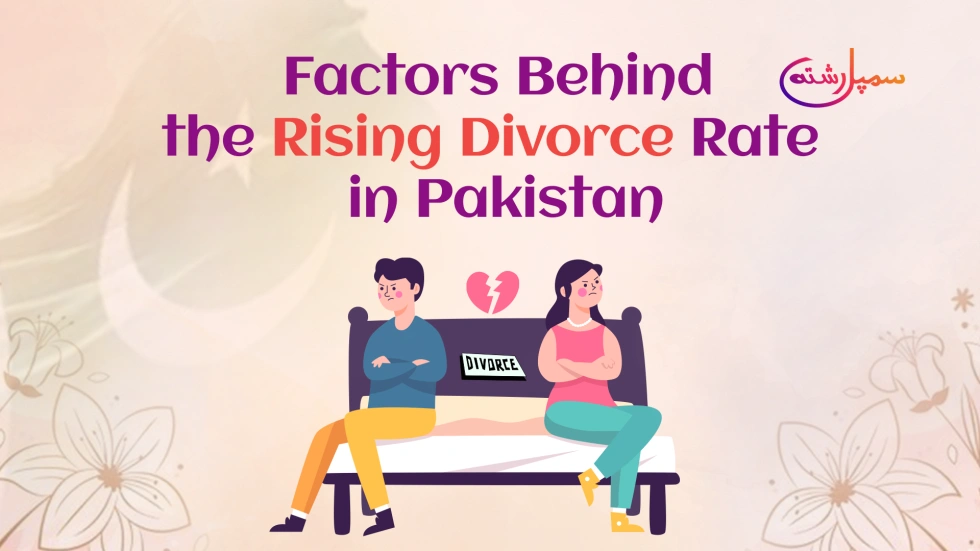In recent years, divorce rate in Pakistan has increased noticeably. Which is both alarming and shows changes happening in society. Various factors contribute to this phenomenon, including economic pressures and changing cultural standards. Therefore, understanding these factors is crucial for addressing the root causes and promoting healthier marital relationships. This blog delves into the primary reasons behind the increasing divorce rate in Pakistan.
1. Financial Stress
One of the significant contributors to the rising divorce rate in Pakistan is economic pressure. The cost of living has risen, and many families struggle to make ends meet. Financial instability can create stress and tension within a marriage. It leads to conflicts that may eventually result in divorce. The inability to provide for the family or meet societal expectations can be a substantial burden on marital relationships.
2. Employment Challenges
Unemployment and underemployment are prevalent issues in Pakistan. When one or both partners are unable to secure stable employment, it can lead to frustration and disappointment. The lack of financial security can strain relationships as financial worries often dominate daily life, leaving little room for emotional connection and understanding.
3. Women’s Empowerment
The empowerment of women is another critical factor contributing to the rising divorce rate in Pakistan. As more women gain access to education and employment opportunities, they become more aware of their rights and less willing to endure abusive or unsatisfactory marriages. Women who are financially independent have the option to leave unhappy marriages, a choice that was not as readily available in previous generations.
Traditionally, societal expectations in Pakistan pressured women to stay in marriages, even unhappy ones. Daughters were often told their husband’s home was their permanent residence, and returning to their parents after arguments wasn’t an option. This lack of support system left women with little choice but to endure marital difficulties.
Today, however, Pakistani women are increasingly independent. They have the confidence to know they can survive on their own, even without familial support. This newfound independence empowers them to leave marriages that are unhealthy or filled with unreasonable pressure.
4. Shift in Traditional Roles
The traditional roles of men and women in Pakistani society are evolving. Women are no longer confined to household duties and are increasingly participating in the workforce. This shift can sometimes lead to conflicts within the marriage. Especially if the husband does not support or accept the wife’s career aspirations. The clash between traditional expectations and modern realities can create friction and lead to divorce.
5. Family Interference
In many families, certain members like in-laws or siblings often get too involved in a couple’s personal life. They want to know everything, give advice that’s not asked for, and sometimes criticize one of the spouses. If this interference isn’t stopped, it can cause fights and stress between the couple, leading to misunderstandings and hurt feelings.
6. Refusal to Compromise
Some people enter marriage without being willing to compromise on anything. They view compromise as a threat to their rights, pride, dignity, and ego. Quick decisions to marry without discussing motives, goals, beliefs, careers, finances, and family expectations often lead to impulsive weddings.
Girls often dream of a lavish wedding because they are influenced by media and society. If their friends or colleagues marry someone wealthy, from overseas, or through a love marriage, they also aspire to the same, even if it’s beyond their means. If they marry under family pressure, they may refuse to compromise on less, which can lead to divorce.
7. Influence of Media
Television, movies, and social media influence people’s perceptions of marriage and relationships. Young generation see different lifestyles and relationships on media, which can create unrealistic expectations and dissatisfaction with one’s own marriage. Additionally, Media often glorifies romance and perfection, which leads individuals to believe that their marriage is lacking.
8. Urbanization
Urbanization creates a more individualistic society. In urban areas, people rely less on extended family networks for support. They focus more on personal achievement and satisfaction. This shift reduces tolerance for marital issues and increases the likelihood of divorce. Because individuals prioritize personal happiness over family cohesion.
9. Easier Access to Divorce
Due to the changes in the legal system, it is easy for individuals to get divorced. A process that was once long and difficult is now much easier. Furthermore, legal assistance and increasing awareness of rights enable people to act against unsatisfactory marriages.
10. Support Networks
The support networks, such as counselling services and support groups, also play a significant role. These networks provide individuals with the resources and courage to leave unsatisfactory marriages. Consequently, knowing that help is available makes the decision to divorce less daunting.
11. Compatibility Issues
Compatibility issues are a common reason for divorce. As people evolve and grow, their interests, values, and goals change. Which leads to a mismatch between partners. This lack of compatibility can result in continuous conflicts and dissatisfaction. Which eventually leads to divorce.
12. Mental Health
Mental health issues, including depression, anxiety, and stress, can significantly impact marital relationships. If one or both partners are struggling with mental health problems, it can create an environment of tension and misunderstanding. Therefore, without proper support and treatment, these issues can lead to the breakdown of the marriage.
13. Extramarital Affairs
Infidelity is a major reason for more divorces in Pakistan. When one partner cheats, it breaks trust and harms the relationship deeply. This often leads to the marriage ending. Mostly, men are involved in cheating and may pressure their wives to stay silent. Women might feel ashamed to talk about their husband’s affair. Moreover, sometimes, their parents advise them to endure it because they can’t support a divorced daughter.
14. Trust Deficits
Beyond infidelity, a general lack of trust between partners can contribute to marital breakdowns. Trust is the foundation of any relationship, and its absence can lead to suspicion, jealousy, and conflict. Rebuilding trust is challenging, and many couples find it difficult to overcome this hurdle. Therefore, it sometimes results in divorce.
15. Physical and Emotional Abuse
Domestic violence, including physical and emotional abuse, is a critical factor in the rising divorce rate in Pakistan. Women are increasingly unwilling to tolerate abusive relationships. Moreover, awareness campaigns and support services have empowered victims to leave abusive marriages and seek legal recourse.
16. Infertility
Sterility or infertility can also be a reason for divorce. When a couple faces challenges in conceiving or having children, it can lead to emotional strain, disappointment, and differences in how to approach family planning. These factors can contribute to marital conflicts and, in some cases, lead to divorce if the couple cannot find common ground or support each other through the challenges of infertility.
Consequences of Rising Divorce Rates
- Children from divorced families often face emotional trauma, social stigma, and academic challenges.
- Although attitudes are changing, but societal stigma around divorce, especially for women, still exists. Due to this the feelings of isolation and judgment for divorce may increase.
- Divorce can cause significant financial challenges, particularly for women. They might struggle to find housing or employment. Additionally, child custody arrangements can also impose additional financial burdens.
- The breakup of families can weaken communities. Strong families are the foundation of a stable society, and rising divorce rates can raise concerns about social cohesion.
Addressing the Rise in Divorce
To tackle the increasing divorce rate, a comprehensive approach is necessary. Here are some potential solutions:
- Families should intervene when a couple is on the brink of divorce, listening to both sides and working to find common ground.
- We must encourage couples to attend pre-marital counselling sessions. Which can equip them with communication skills, realistic expectations, and ways to resolve conflicts.
- Constant efforts in educating and economically empowering women can give them more control over their lives and decisions, including marriage.
- Talking openly about healthy relationships, gender equality, and communication in marriage. So that it can make divorce seem more acceptable when it’s the right choice.
- We need to improve laws to protect both spouses during divorces. Which ensures fairness in outcomes.
- Mental health services should be accessible for all. Moreover, we must raise awareness about mental health issues. Which can help individuals deal with marital challenges more effectively.
The increasing divorce rate in Pakistan shows a changing view of marriage where old traditions are meeting new challenges. Furthermore, economic pressures, changes in how men and women see their roles, and what society expects all contribute to more couples splitting up. To address this, Pakistan needs to carefully consider its cultural values alongside what people need today. So, by helping people financially, giving them more control over their lives, and talking openly about relationships, Pakistani people can help marriages last longer and be more satisfying in the future.



waqai talaq buhat aam ho gayi hai
nice blog
I believe a major factor is also the lack of effective communication between couples. Many marriages struggle due to unrealistic expectations, external family pressures, and the inability to adapt to modern challenges.